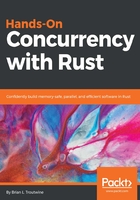
Memory model
The details of a processor's handling of memory is both complicated and very specific to that processor. Programming languages—and Rust is no exception here—invent a memory model to paper over the details of all supported processors while, ideally, leaving the programmer enough freedom to exploit the specifics of each processor. Systems languages also tend to allow absolute freedom in the form of escape hatches from the language memory model, which is exactly what Rust has in terms of unsafe.
With regard to its memory model, Rust is very much inspired by C++. The atomic orderings exposed in Rust are those of LLVM's, which are those of C++11. This is a fine thing—any literature to do with either C++ or LLVM will be immediately applicable to Rust. Memory order is a complex topic, and it's often quite helpful to lean on material written for C++ when learning. This is especially important when studying up on lock-free/wait-free structures—which we'll see later in this book—as literature on those topics often deals with it in terms of C++. Literature written with C11 in mind is also suitable, if maybe a little less straightforward to translate.
Now, this is not to say that the C++ programmer will be immediately comfortable in concurrent Rust. The digs will be familiar, but not quite right. This is because Rust's memory model also includes a notion of reference consumption. In Rust, a thing in memory must be used zero or one times, but no more. This, incidentally, is an application of a version of linear-type theory called affine typing, if you'd like to read up more on the subject. Now, the consequence of restricting memory access in this way is that Rust is able to guarantee at compile-time safe memory access—threads cannot reference the same location in memory at the same time without coordination; out-of-order access in the same thread are not allowed, and so forth. Rust code is memory safe without relying on a garbage collector. In this book's estimation, memory safety is a good win, even though the restrictions that are introduced do complicate implementing certain kinds of structures that are more straightforward to build in C++ or similar languages.
This is a topic we'll cover in much greater detail in Chapter 3, The Rust Memory Model – Ownership, References and Manipulation.